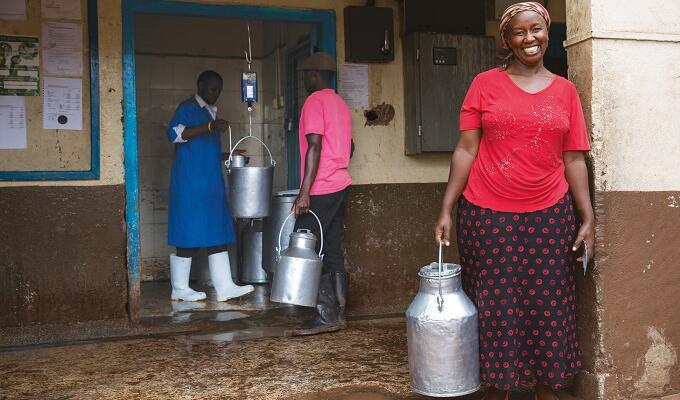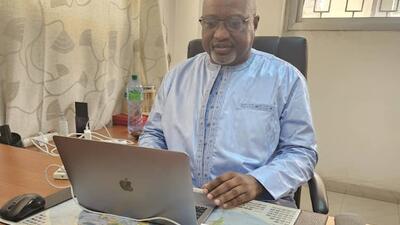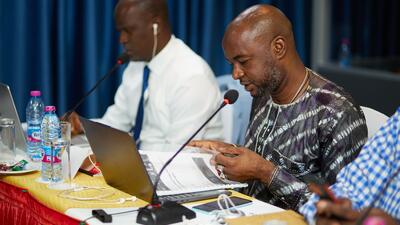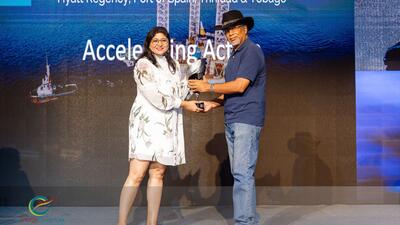

Democratizing trade, breaking down barriers with digital technology
Entrepreneurs can benefit, boost production with digital platforms
Micro, small and medium-sized enterprises (MSMEs) play a critical role in economic development and job creation for all countries. This is particularly the case in developing countries, where they are estimated to contribute up to 60% of total formal employment and up to 40% of national income. These numbers increase significantly if you also take into account the informal sector.
However, MSMEs continue to face considerable barriers to fulfilling their economic potential. They generally have less involvement in international trade and exposure to foreign direct investment, which means their competitiveness and productivity often lag behind. As a consequence, the risk and cost of trying to gain access to markets, value chains and financial services severely limits their ability to grow.
Take financial services as an example. Today up to 80% of global trade is supported by some kind of financing or credit insurance, but approximately 70% of all MSMEs in developing markets lack access to credit.
The harsh reality is that MSMEs in developing economies, many of which are rural businesses and smallholder farmers, find it incredibly difficult to do business. They are often at the end of value chains, unable to participate in trade ecosystems and must deal with a number of intermediaries, which increases costs substantially.
MSMEs prospects must be improved and embracing digital technology should be a priority. E-commerce platforms alone give MSMEs an affordable and efficient way to communicate directly with a broad customer base domestically and internationally. The World Trade Organization (WTO) estimates that 97% of internet-enabled small businesses export while the rate for traditional SMEs ranges between 2% and 28%.
Such e-commerce platforms are key and must be seen as one component of a broader set of digital solutions.
Specifically, in order to grow, MSMEs not only need access to consumers (B2C), but also to the regional and global value-chains and production networks (B2B), which dominate trade today. The good news is that digitization is making it significantly easier for multinational and larger domestic companies to do business with MSMEs in developing countries and for smaller businesses to participate in such ecosystems.
Agriculture presents both unique challenges and opportunities in this regard. Approximately 80% of the farmland in Asia and sub-Saharan Africa is managed by smallholders who work no more than 10 hectares. Small-scale farms – usually representing the largest, yet most marginalized and vulnerable segment of the economy – struggle to grow because larger members of the agriculture ecosystem view them as expensive and risky to do business with. As a consequence, these farmers have limited access to information, financial services and supplies, which results in poor yields, low prices, high costs and difficulties in accessing formal markets.
This is where digital technology can help. For example, Connected Farmer, developed by Vodafone, Vodacom and Mezzanine, a company that delivers mobile-enabled solutions to companies doing business in Africa, uses mobile technology to make it easier for farmers to interact and transact with other businesses. It incorporates mobile payments such as M-PESA, receipting, communications, stock management and tools that improve decision-making and yield.
Connected Farmer also allows farmers to build a transaction history, giving buyers and suppliers a greater understanding of a farm’s day-to-day operations. This makes it easier for farmers to access financial services. Many farmers use a loan facility, associated to the contracts they have in place, to purchase supplies and services from other companies. Furthermore, where state support is available, the government can use Connected Farmer to give vouchers to farmers, which they can use to buy supplies and services. In Zambia and Kenya, for example, the government use the platform to provide farmers with e-vouchers to buy supplies.
All this helps increase productivity for smallholder farmers and increases efficiency for larger agriculture businesses that buy from them.
This is the case with Multiflower, a flower-cutting business in the United Republic of Tanzania, which works with 3,500 small-scale farmers over a vast geographic area. Before using Connected Farmer, farmers would have to make long and expensive journeys to Multiflower offices to receive payments and loans. On average, this took eight hours and cost around $12 – not a small amount when many farmers earn less than $2 a day.
Another success story is Kenya’s Ndumberi Dairy Farmers Cooperative Society, which collaborates with small-scale farmers owning up to 10 cows. By using Connected Farmer, within just 12 months the co-operative brought 23% more farmers into its supply chain and production volumes increased by up to 50% per cow while the Co-operative reduced its operating costs by 40%.
Some of the food and agribusinesses using Connected Farmer estimate the access to supplies, services and information – sometimes as simple as informing farmers of the right blend of fertilizer for their soil – has helped increase production by up to 200% within two crop cycles.
No wonder, therefore, that farmers and agribusinesses alike are embracing the change brought about by digital services. Clearly, technology has incredible power to boost productivity, unlock value and raise revenues for MSMEs. It also needs to be part of a broader effort by policymakers to clear a path for MSMEs to succeed. This includes creating a supportive regulatory environment, investing in fast and reliable digital infrastructure, and implementing policies that stimulate the accessibility and use of new technologies.
The ability of MSMEs to access regional or global markets depends heavily on the extent they can participate in their local trade ecosystems. Digital technology offers them a gateway to those ecosystems, the first step in democratizing trade and bringing its full benefits to everyone for the first time.















